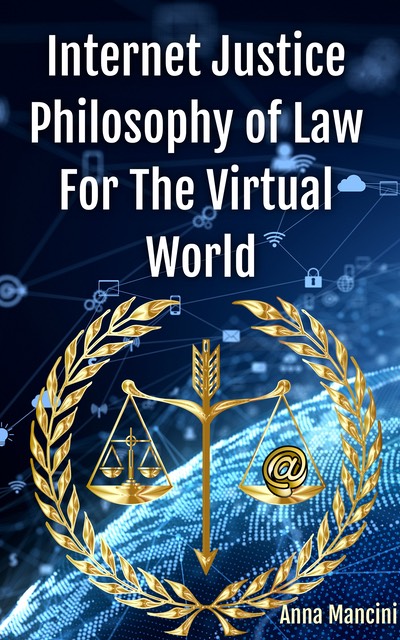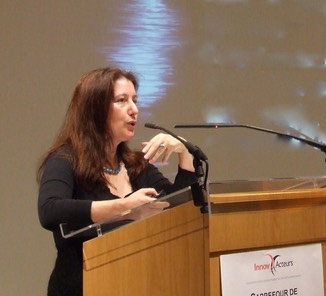Book Description
Our law and its philosophy were conceived for a material economic world marked by scarcity and territoriality.
Without the criterion of territoriality, the dominant philosophies of law are left bankrupt. This is especially the case for KELSEN's Pure Theory of Law, in which the territoriality criterion is the cornerstone.
Since the world of Internet is marked by abundance rather than scarcity, it has no territorial boundaries and it is not material, it is easy to understand that it cannot be efficientlymanaged according to our traditional legal and philosophical principles. On the Internet, even the Aristotelian concept of justice -which gives each his own and shares a limited amount of goods- is old hat.
Although our law only recognizes this concept of justice and its nuances -as in RAWLS' Theory of Justice-, it is however impossible to apply this idea of justice efficiently in cyberspace.
This book proposes a philosophy of justice suited to the virtual world and some legal principles that law-makers could apply to act efficiently and help the development of the Internet and the Information Society.
Author: Anna Mancini

Buy paperback on Amazon.com

Anna MANCINI, Ph. D, is a specialist in intellectual property laws and Internet law and has published several books on these subjects. She has worked with a patent firm in Paris and media companies in Brussels and taught at university level. She is the founder of Innovative Justice, a Paris-based research organization on the modernization of law, created in 1994.
List of Books published in English, by Anna Mancini
- Your Dreams Can Save Your Life
- The Meaning of Dreams
- Maat Revealed, Philosophy of Justice in Ancient Egypt
- How to unlock the secrets, enigmas, and mysteriesof Ancient Egypt and other old civilizations
- Ancient Roman Solutions To Modern Legal Issues, The Example of Patent Law
- Scientific Creativity
- Internet Justice, Philosophy of Law for the Virtual World
- International Patent Law is Obsolete
- Copyright Law is Obsolete
CONTENTS
Part 1 : Fundamental differences between cyberspace and real space
Chapter 1 Earthly life and virtual world 3
Chapter 2 Wealth from matter and wealth from people 21
Part 2 : The legal impact on the virtual world: the example of ancient Roman law
Chapter 3 The theories of the distinction 47
between material rights and personal rights
Chapter 4 The Roman root 55
Chapter 5 Testing the findings 65
Chapter 6 Roman knowledge applied to the Internet 73
PART 3 : Which kind of justice for the Internet?
Sub-part 1 : Philosophy of justice in Ancient Egypt
Chapter 7 Ancient Egypt, 89
a civilization focused on justice
Chapter 8 Egyptian Justice and free flow of ideas 93
Sub-part 2 : The Egyptian idea of justice applied to the Internet
Chapter 9 Prosperity and circulation in Egypt 111
and in "primitive" tribes
Chapter 10 Slowing down the 115
information flow: the American experience
Chapter 11 Hindering the information 123
flow: the French use of the Minitel
Conclusion 131
Notes 183
Bibliography 221
PREFACE
________________________________________
The world of ideas, so cherished by Plato, is made available to the human mind as much by the Internet as by pictorial design or the written word. The novelty introduced by the Internet is not virtuality in itself, but only the extended power to free ideas from the physical constraints of space, time and the material world in general, as well as from censorship. Thus, the entire mental world of modern man can display itself on the Internet, and all kinds of ideas, information and pictures can be emitted. Therefore, it can come as no surprise to find the dark side of the human psyche as well as the expression, sometimes crude and perverted, of its universal attraction to sexuality, disseminated throughout this new form of virtuality. The expression of sexual perversion and the development of electronic commerce are the two main excuses invoked by states for their legal intervention. Unfortunately, bound as it is by geographical limits, governmental regulation is ill-adapted to the worldwide dimension of the Internet: globalization increasingly impedes the efficiency of national laws.
Moreover, a wide majority of Internet users rejects any legal intrusion into this space, conceived essentially as a realm of thought and fantasy, free from constraint. They argue that the Internet has developed and expanded without the help of legal authorities. Why should governments disturb a world that has no use for them, and which has profited so much from its freedom? Some people answer that laws have become necessary due to the many abuses now existing in cyberspace. They believe states should intervene to protect, say, privacy or the rights of authors, both of which seem to be seriously threatened by the Internet. With greater originality, one author states that, as the Internet is becoming a space where the technological "code" (software) designed by industrial "authorities", is effectively substituting itself for law, citizens should possess control over this new kind of hidden legal power. He believes that citizens should be made aware of this evolution of the Net and should be able to choose, as they do in the "real" world, the values they want to promote. Which values should we choose? American constitutional values? Chinese values? Indian or French values? If we put the question this way, we inevitably fall back on the positive law of a given state.
But any such choice is once again confronted by the extra-national dimension of the Internet. An adaptation of old national laws to new circumstances no longer serves any purpose: we must be more creative, as Lawrence LESSIG observed. As cyberspace and real space function differently, they cannot implicate the same legal values. The most elementary wisdom invites us to forget our legal past,
so obviously ill-adapted to the Internet, so as to gain a better insight into the functioning of virtual space. Attempts to regulate the Internet in the same way as the real world have inevitably failed and will continue to fail. The only solution that can foster the expansion of the net and justify state intervention will come from a philosophy of law suited to virtuality. Our philosophical legal traditions stemmed from agricultural and industrial roots and are therefore widely useless within the virtual context. They cannot help us - but the philosophy of ancient civilizations can. At first sight, it may seem paradoxical to look to ancient civilizations for counsel on legal regulation of the Internet. But the virtual world is not a modern invention. It has existed for ever; although we previously tended to ignore it because it did not seem to be of great economic value. The development of electronic commerce is now opening our eyes to the economic power of the intangible world. Ancient Egypt and Rome did not have the Internet, but they were aware of the importance of an intangible world. They accurately observed the functioning of that world and used their knowledge of it in the legal field. The Ancient Egyptians invented an original and useful concept of "virtual justice"
whose aim was to create prosperity. The very practical ancient Romans noticed an overlap between virtuality and matter, and they used this overlap in the foundation of their legal system. Internet Justice demonstrates that the legal philosophy and knowledge of these two ancient civilizations are of great value in helping us deal with the Internet.
INTRODUCTION
________________________________________
Recent attempts from many governments proved the inefficiency of the traditional legal ruling in the context of the Internet.
Even slightly modified the existing laws are unsuitable. Why? In order to find an answer to this question we must closely observe the modern positive legal systems. This way, we will be able to perceive the main features of these systems more clearly in order to confront them with the Internet’s virtual world. The essential features of the modern positive legal systems turn mainly:
- on one side, around the concept of territory, without which positive laws cannot work, while this concept is on the contrary totally out
of purpose in the virtual world;
- on the other side, around the essential distinction between things and persons. Positive laws are mainly focused on sharing material things and on dealing with the right of property. The Internet is focused on the personal side of life, and on the creativity and prosperity coming from persons and not from things. The legal distinction between things and persons was already used by the ancient Roman lawyers when they invented the distinction between the action in rem and the actio in personam. During the sixteenth century, with the emergence of the concept of subjective rights, this distinction was mistranslated in continental legal systems. It was rendered by the unclear legal distinction between real (material) subjective right (droit réel subjectif) and personal subjective right (droit personnel subjectif) which is still effective. The first part of the work seeks to clarify the fundamental differences between cyberspace and "real" space. We shall examine in chapter 1 the ensuing consequences of the concept of territory. In the second chapter we shall examine the differences between cyberspace and real space emerging from their respective focus on matter and on persons. The second part of the book describes the pragmatic approach taken by the ancient Roman lawyers to the virtual world, an approach that sheds light on some several important Internet-related issues. The third part explores the ancient Egyptian concept of justice. Finally the work applies that concept to the Internet